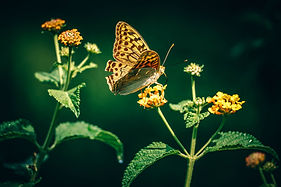
360 eco market
BUTTERFLYway RANGER PROJECT
360 Eco Market has partnered with the David Suzuki Foundation to become Butterflyway Rangers in Oshawa. In 2017, the David Suzuki Foundation (DSF) initiated the Butterflyway Project, and its sister campaign, L’Effet papillon, in Quebec, in five Canadian cities. This volunteer-led movement brings nature home to neighbourhoods, one butterfly-friendly garden (habitat) at a time.
The Butterflyway Project focuses on the establishment and stewardship of habitat gardens. This requires research into native plant communities and insect lifecycles, careful consideration of where plants are grown and sourced from, and pollinator-friendly care and maintenance.


Habitats
Habitat gardens support insects (and more!) at all stages of life and through all seasons, while also sequestering carbon and managing stormwater. This is possible through the inclusion of native plants that feed native insects and birds and the protection of habitat features such as fallen leaves, dead plant stems, rotting logs and snags wherever possible. Habitat gardens can be any size. You can plant in a window box, on a balcony or rooftop, in a community garden, beside a road or in a park – the options are limitless! If your garden is small, help neighbours establish the same type of garden to create more habitat and foraging opportunities for pollinators. This is what the Butterflyway Project is all about. Although there is no minimum distance requirement between gardens, establishing them close together makes it more likely that pollinators will move from one to another.
Native Plants
why are they important?
A native plant has existed in an area for millennia and has evolved along with other native species of plants, animals, fungi and bacteria in the presence of native soil and climatic conditions. Native plants play an important and foundational role in ecosystems. They provide food, shelter and nesting material for insects, birds, mammals, amphibians and reptiles. These plants are also tied to Indigenous cultures, being used for food, fibre, medicine and ceremony. Despite their beauty and ecological importance, native plants remain a mystery to many people, and are underrepresented in our gardens.
While it is true that non-native plants may provide shelter, nesting opportunities and food, native plants support a greater diversity and number of native wildlife, at all stages of their lives. Insect herbivores have evolved with native plants so that they can combat the
defenses of some of them and avoid those for which they cannot. Many of these insects – at least in the larva stage – are specialized. This means that they feed on one native plant or a small number of native plants only. One specialization example, which most of us are
familiar with, is the monarch butterfly. Adult monarchs lay their eggs on milkweed plants alone, and monarch caterpillars only consume milkweed leaves.
Non-native plants are foreign to native insects. When our gardens and neighbourhoods are filled with non-native plants, we have fewer insects, and fewer birds and other animals that rely on them for food. Research by the University of Delaware Professor Douglas
Tallamy and his graduate students confirms that more than 96 per cent of terrestrial birds raise their young on insects.

Resources
Want to join the 360 Eco Market Butterflyway Ranger Project? Here are some resources to get you started:




